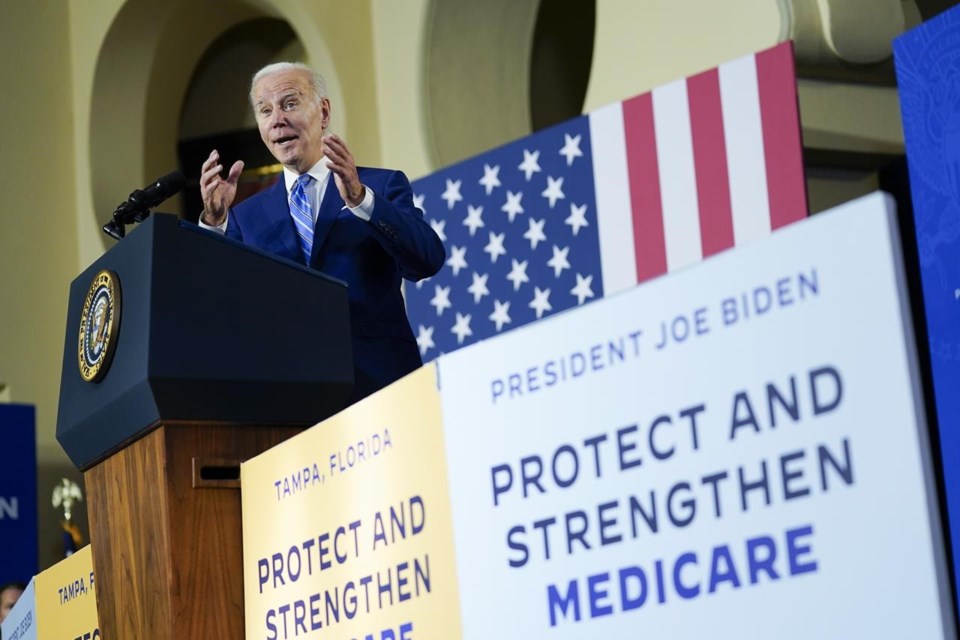WASHINGTON (AP) — President Joe Biden announced Thursday that hundreds of thousands of immigrants brought to the U.S. illegally as children will be able to apply for Medicaid and the Affordable Care Act's health insurance exchanges.
The action will allow participants in the Obama-era Deferred Action for Childhood Arrivals program, or DACA, to access government-funded health insurance programs.
“They’re American in every way except for on paper,” Biden said in a video released on his Twitter page. “We need to give Dreamers the opportunities and support they deserve.”
The action is likely to generate significant pushback from conservative leaders of states that have been reluctant to expand Medicaid and critical of the Biden administration's response to migrants who enter the U.S. illegally. While the federal government provides funding and guidelines for Medicaid, the program is administered by the states.
Then-President Barack Obama launched the 2012 DACA initiative to shield from deportation immigrants who were brought to the U.S. illegally by their parents as children and to allow them to work legally in the country. However, the immigrants, known as “Dreamers,” were still ineligible for government-subsidized health insurance programs because they did not meet the definition for having “lawful presence” in the U.S. Biden's Department of Health and Human Services will aim to change that by the end of the month.
The White House action comes as the DACA program is in legal peril and the number of people eligible is shrinking.
An estimated 580,000 people were still enrolled in DACA at the end of last year, according to U.S. Citizenship and Immigration Services. That number is down from previous years. Court orders currently prevent the U.S. Department of Homeland Security from processing new applications. The DACA program has been mired in legal challenges for years, while Congress has been unable to reach consensus on broader immigration reforms.
DACA recipients can work legally and must pay taxes, but they don’t have full legal status and are denied many benefits, including access to federally funded health insurance, available to U.S. citizens and foreigners living in the U.S.
Paloma Bouhid, 26, a DACA recipient originally from Brazil and small business owner in Orlando, Florida, where she grew up, said the announcement was a “huge sigh of relief.” Bouhid said she began her business in 2021 after losing her job with the Walt Disney company in 2020 amid the COVID-19 pandemic, but being self-employed meant she had to pay $500 a month for private insurance following a health scare last year.
“This past year I have really been scrambling to just get all of my doctors appointments in,” Bouhid said. “Any doctor’s visits due, everything that I possibly can, because prior to today’s announcement, I really couldn’t afford to keep it any more than the year I have had it.”
During the COVID-19 pandemic, many people signed up for Medicaid, the program that provides health care coverage for the poorest Americans. And the government increased federal subsidies to drive down the cost of insurance plans on the Affordable Care Act’s marketplace. As of last year, just 8% of Americans were without health insurance, according to Health and Human Services.
But immigrants living in the U.S. without documentation are far more likely than others to not have health insurance. More than a third of DACA recipients are estimated to be without health care coverage, HHS said. About half of the roughly 20 million immigrants who are living in the U.S. without documentation are uninsured, according to research from the Kaiser Family Foundation.
Providing more people with insurance could have a positive impact on the entire health care system because it would give more people access to routine checkups and avoid emergency visits, said Jamila Michener, associate professor of government and policy at Cornell University.
“Having sizeable groups of people who live, work, go to school and make their home in the U.S. but cannot access vital health benefits is bad for everyone," Michener said in an email. “It makes preventive care less accessible thus driving up the cost of emergency care.”
Jose Muñoz, national communications manager for immigration advocacy organization United We Dream, said the announcement was a “major victory.” He said that until today, hundreds of thousands of people who benefit from DACA have been obligated to pay higher quantities for private insurance if their employers did not offer insurance or they were self-employed, or go uninsured.
“When you are thinking about going to the doctor for an annual checkup or like when you’re sick, those are a part of life and it is such a human need,” Muñoz said. “Unfortunately for far too many people, especially for undocumented people, getting affordable health insurance is often inaccessible.”
Jose Magaña-Salgado, founder of the Masa consulting group and a DACA recipient, said that growing up he witnessed his cousin, who was undocumented, be put in hospice and pass away after being diagnosed with cancer because she did not have insurance to help her pay for treatment. Magaña-Salgado has spent years advocating for health insurance for his fellow recipients and all immigrants.
“I went for several years without health insurance wondering if a medical bill was going to send me to bankruptcy or, even worse, lead to passing away early,” Magaña-Salgado said.
While there’s bipartisan support to enact some sort of protections for the immigrants, negotiations have often broken down over in debates about border security and whether an expansion of protections might induce others to try to enter the U.S. without permission. Biden, a Democrat, has repeatedly called on Congress to provide a pathway to citizenship for immigrants brought to the U.S. illegally as children.
Other classes of immigrants — including asylum seekers and people with temporary protected status — are already eligible to purchase insurance through the marketplaces of the ACA, Obama’s 2010 health care law, often called “Obamacare.”
__
Associated Press writer Acacia Coronado contributed to this report from Austin, Texas.
Zeke Miller, Amanda Seitz And Michael Balsamo, The Associated Press

